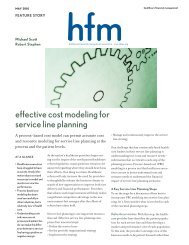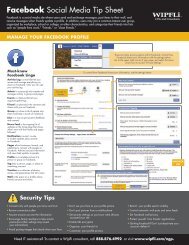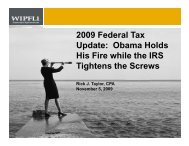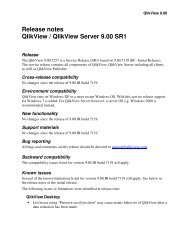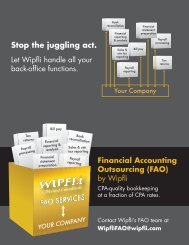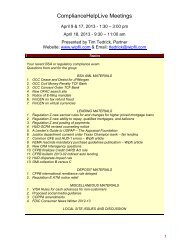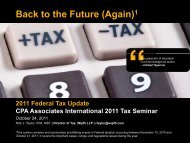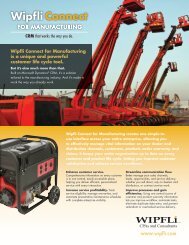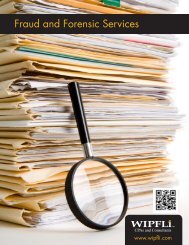Download PDF - Wipfli
Download PDF - Wipfli
Download PDF - Wipfli
You also want an ePaper? Increase the reach of your titles
YUMPU automatically turns print PDFs into web optimized ePapers that Google loves.
Canada Update<br />
New Canadian treaty-based<br />
withholding rate and benefit forms<br />
In April 2011, the Canada Revenue Agency (CRA) released<br />
final versions of declaration forms that should be used by<br />
non-residents of Canada to provide the CRA and Canadian<br />
resident payers with information regarding their residency<br />
status and eligibility for treaty benefits.<br />
These new forms are important for both Canadian resident<br />
payers and non-resident payees of interest, dividends, rents,<br />
royalties, management fees and other similar payments<br />
which are subject to Part XIII non-resident withholding tax<br />
in Canada and may be eligible for a reduced withholding<br />
tax rate under a treaty. The forms can also be used when<br />
requesting a refund of Part XIII withholding tax, obtaining<br />
a Regulation 105 withholding tax waiver, requesting a<br />
certificate of compliance or filing a Canadian tax return for<br />
a hybrid entity.<br />
The introduction of these forms resulted from the changes<br />
in the Fifth Protocol to the Canada-US Tax Treaty. The forms<br />
are similar to the US Form W-8BEN, Certificate of Foreign<br />
Status of Beneficial Owner for United States Tax Withholdings.<br />
■ NR 301 - Declaration of Eligibility for Benefits under a<br />
Tax Treaty for a Non-Resident Taxpayer (i.e., Individual,<br />
Corporation or Trust)<br />
■<br />
■<br />
NR 302 - Declaration of Eligibility for Benefits under a<br />
Tax Treaty for a Partnership with Non-Resident Partners<br />
NR 303 - Declaration of Eligibility for Benefits under a<br />
Tax Treaty for a Hybrid Entity.<br />
For the purposes of the forms, a hybrid entity is an entity<br />
that is considered "fiscally transparent" under the tax laws<br />
of a country that Canada has a tax treaty with and not<br />
"fiscally transparent" for Canadian tax purposes. For<br />
example, a US limited liability company is generally treated<br />
as a partnership for US tax purposes, but is treated by the<br />
CRA as a corporation for Canadian tax purposes.<br />
Additional information and copies of the forms and<br />
instructions can be obtained from the CRA website.<br />
Our commentary is available on the Smythe Ratcliffe LLP<br />
website at http://www.smytheratcliffe.com/pdf/Cross-Border-<br />
Tax-Update-NR301-302-and-303.pdf.<br />
Inbound investment into Canada<br />
US businesses continue to find it difficult to structure their<br />
new and ongoing ventures in Canada in the wake of the<br />
Fifth Protocol to the Canada-US Tax Treaty signed in 2007.<br />
An unlimited liability company (ULC) is a certain type of<br />
Canadian corporation that can be incorporated in the<br />
provinces of Nova Scotia, Alberta and British Columbia.<br />
10 // PKF International Tax Alert All Regions<br />
Issue 8 November 2011




